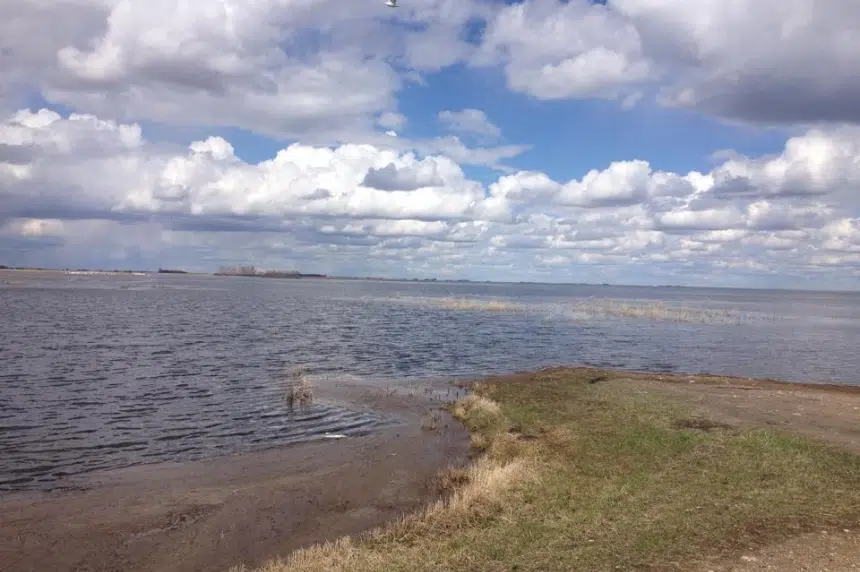Flooding on the Quill Lakes has left thousands of acres of farmland under water, but local farmers are not happy with the plan to divert water, and neither are people living downstream.
After 10 years of rising water levels, the Quill Lakes are close to overflowing and sending salt water into Last Mountain Lake. The Water Security Agency is now proposing to build a berm around the north shore to protect the highway and railroad and divert water from the Kutawagan Lake into Last Mountain Lake instead of the Quill Lakes.
Kerry Holderness is a councilor with the R.M. of Lakeside and he is part of the Quill Lakes Flood group which has been representing local farmers at a series of public and private meetings with the WSA. He says the majority of people at those meetings are upset about the proposal for very different reasons.
“There has been an overblown concern about salinity affecting people downstream and I think the biggest concern should be for actual flooding,” he said.
Holderness says there’s no way to tell if the Quill Lakes have peaked and if the water continues to rise, every lake will be impacted by flooding. He says the diversion from Kutawagan Lake is not enough, and the plan to build a berm could be devastating to farmers who have already lost a lot of land and stand to lose a lot more.
“That’s a death sentence for any property owner around the lake, because even if their land isn’t flooded, their land is now worthless because you can’t sell anything in a flood plain that the government has guaranteed they’re going to dam off,” Holderness said.
“The losses that have taken place so far are minor compared to what could happen if this project goes through.”
When he meets people from the Qu’Appelle Lakes who are fighting against the release of any water, Holderness asks them how they would feel if the positions were reversed.
Holderness is advocating for the government to compensate farmers for the loss of their land.
“If there was a hydro electric dam gets built or if, for any reason a dam gets built in this province for the benefit of other people upstream and down, there’s at least a compensation paid for those people who have to withstand that water for the benefit of everybody else,” he said. “There has been not one offer of compensation so far.”
Cherylynn Walters lives far downstream on Crooked Lake and she is also the chair of the Crooked and Round Lakes Flooding Committee. She has been going to the public meetings to fight against this proposal because she says the Qu’Appelle River basin is already saturated.
“We’ve just had, three out of the last five years we’ve been flooded down here and had tremendous property damage and people have lost their homes and we’ve got incredible erosion happening,” Walters explained. “All they’re doing is diverting water from one problem and creating another problem further down the chain.”
Walters also has a big concern about the lack of environmental reviews to determine the impact of the salt water on the aquatic ecosystem. She says they don’t really have any solid answers about what the water could do to the fish or birds in the wildlife preserve on Last Mountain Lake.
“Nobody has any answers for us. When you go to these meetings, it just brings out more questions because they really don’t know,” she said. “That makes this extremely reckless and totally irresponsible.”
The WSA proposal says water in the Kutawagan Lake is less salty so it shouldn’t threaten the fish populations downstream. But Walters isn’t convinced and she wants to see a lot more work done before any plan goes ahead.
“After 10 years of sitting and doing nothing, they’re just going to push it out and say they tried and so we’re not happy,” she said.
Patrick Boyle with the WSA says the agency welcomes the public feedback from all sides because that is the point of public consultation. He says more than 100 people have turned out to every single open house and the agency has received 130 written submissions.
Despite skepticism from these groups that their opinions will make a difference, Boyle says all sides will be carefully considered before a decision is made.
“Nothing has been decided, this has not been approved,” he said. “Really at this point this is a potential project that is on paper. Nothing has been moved to proceed and all of that decision making process has yet to happen.”
He also assures the public that the WSA has aquatic and wildlife specialists on staff that are studying the potential impact of water quality changes on lakes downstream. There is another public open house set for this week at Quill Lake.











